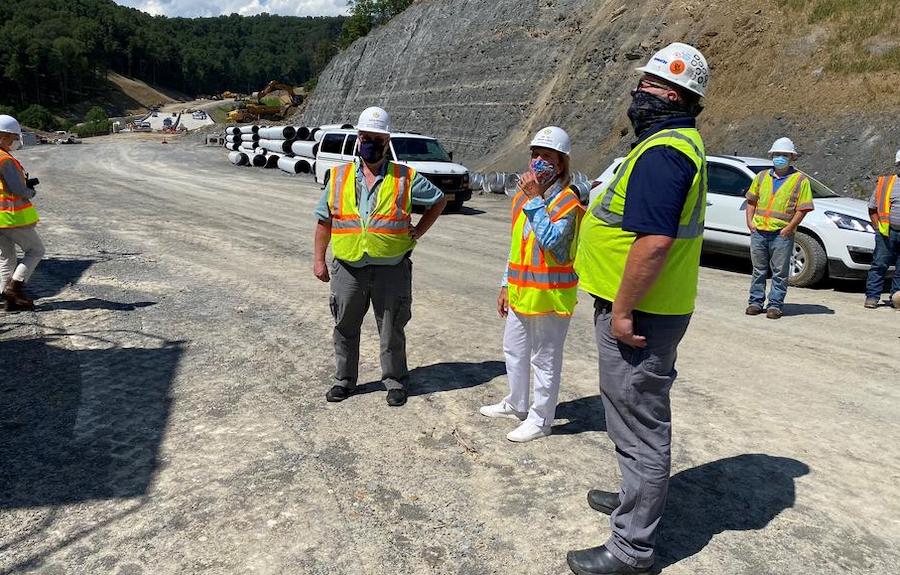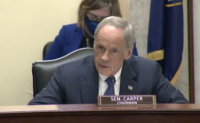Regardless of whether Republicans or Democrats prevail as the majority part when the new Congress convenes in January, there will be changes in leadership on the key Senate Committee that oversees policies and authorizes funds for highways, Corps of Engineers civil works and U.S. Environmental Protection Agency programs.
That's because Sen. John Barrasso (R-Wyo.), who has chaired the Environment and Public Works Committee (EPW), since 2017, announced on Nov. 18 that he would move to the Energy and Natural Resources Committee as its “lead Republican.”
Steve Hall, American Council of Engineering Companies senior vice president for advocacy, says of Barrasso: “I think he’s wanted Energy for some time. I think that’s kind of the heart and soul of his state.”
The leadership of the EPW panel—and all other Senate committees—first depends on whether Democrats prevail in both Georgia races, heading for a January runoff.
If Democrats score both wins, it would result in a 50-50 Senate. In that situation, Vice President-elect Kamala Harris would cast tie-breaking votes in the chamber and the Democrats would likely be awarded committee chairmanships, if the most-recent precedent holds.
In 2001—the last time the Senate split 50-50, a "power sharing" agreement granted the committee gavels to Republicans, after George W. Bush was elected president.
If that happens, Tom Carper (Del.), now EPW's ranking Democrat, would become the committee's chair.
Either way, though, the top construction item on the EPW 2021 agenda is producing the highway section of a new surface transportation reauthorization bill by a Sept. 30 deadline.
The Energy and Natural Resources chair is opening up because the incumbent, Sen. Lisa Murkowski (R-Alaska), must step down due to Republicans’ six-year term limit on holding the position.
Barrasso's successor: To be determined
It’s not certain yet who will succeed Barrasso in the EPW Committee’s top GOP slot. James Inhofe (Okla.) is next in line, but he also chairs the Armed Services Committee and isn’t expected to give that up.
Speculation is centering on Sen. Shelley Moore Capito (R-W.Va.), who is next on the GOP list after Inhofe. One industry lobbyist says he assumes, but isn’t certain, that Capito will be Barrasso’s successor.
Hall says Capito, who joined EPW in 2015 when she came to the Senate, is likely to become its lead Republican. “I think that’s the expectation, and it’s logical,” he says.
Capito hasn’t announced her plans. Kelley Moore, Capito's spokeswoman, said she can't comment about committee leadership at this point but provided a list of what have been the senator's EPW priorities.
They include a five-year highway bill, a new Water Resources Development Act (WRDA), addressing climate change, ensuring EPA meets statutory deadlines in areas such as clean air, and supporting the Economic Development Administration and Appalachian Regional Commission.
John Doyle, special counsel with law and lobbying firm Jones Walker LLP, says, “I don’t see a great deal of substantive difference between Capito and Barrasso.” Both are conservative, he adds. They also are viewed as infrastructure advocates.
Doyle adds that if Capito becomes new EPW chair or ranking member, ”She’s going to continue the tradition of generally collegial, bipartisan lawmaking that’s been the historical hallmark of that committee for a long, long time.”
It's possible Barrasso will remain an EPW member—another industry lobbyist says that if Capito becomes EPW chair, "I assume, but I'm not positive, that Barrasso will be the chair of the [transportation and infrastructure] subcommittee."
Asked about that speculation, EPW committee spokesperson Sarah Durdaller said via email, "Committee and subcommittee membership will be announced next Congress."
Highway bill: 2021 version
Construction and engineering groups will focus closely on how EPW proceeds on the new surface transportation measure. It only has jurisdiction over the highway part of the package; other committees have jurisdiction over transit, highway safety and revenue.
The last big surface transportation measure, the 2005 Fixing America’s Surface Transportation (FAST) Act, lapsed on Sept. 30. Since then, highway and transit programs have been operating under a one-year extension.
EPW in July 2019 laid down its marker for the FAST Act successor’s highway title, unanimously approving a $287-billion, five-year measure. But the bill has yet to move further.
Like all pending bills, the 2019 EPW highway measure expires at the end of the current Congress. The next EPW will have to produce a new version.
Industry lobbyists, citing the 2019 bill's solid bipartisan support, say the committee is likely to use the 2019 measure as a basis for its expected 2021 proposal, with some modifications.
Brian Turmail, spokesman for the Associated General Contractors of America, said via email that Barrasso's infrastructure proposals "can serve as a roadmap for Congress next year."
But he added that AGC expects infrastructure proposals from EPW and other committees in the new Congress "will be modified or new ones will be developed to reflect the policy priorities of each committee's leadership and members, which will include some new members of Congress."
As they scope out the highway bill outlook, Industry officials note Capito, as chair of EPW's transportation and infrastructure subcommittee, played an important role in shaping the earlier Senate EPW measure.
If Capito becomes the committee's new chair or ranking Republican, Hall says it would be “a positive for the stakeholders that want to get a big surface transportation bill done next year."
She issued a press release in 2019 that highlighted several provisions she supported in that earlier measure that had an impact on her state. They included language to speed completion of the Appalachian Development Highway System and a provision to create a five-year, $6.5-billion competitive grant program to repair and replace deficient bridges.
Continued GOP control of the Senate is not assured, however. Doyle says, "If control flips to the Democrats, I think you will see more significant changes" in a highway bill under a Carper chairmanship. Doyle notes the 2019 bill had some green infrastructure and resiliency provisions. In a Democratic-led Senate, he adds, "You'd see those provisions get strengthened, maybe even by quite a bit."
Water infrastructure and PFAS
Besides highways, the EPW committee oversees EPA's clean water and drinking water programs. Kristina Surfus, National Association of Clean Water Agencies managing director for government affairs, said via email that if Capito becomes EPW chair, she "would put a strong focus on critical water issues."
Surfus adds, "She has a demonstrated legislative interest in water quality and infrastructure, including a particular focus on rural water issues.
She expects increased focus on the issue of per-and polyfluoroalkyl substances, or PFAS. Surfus adds Capito "has been a leading Republican urging tighter regulation of PFAS under several statutes," including the Safe Drinking Water and Superfund acts.
Regarding another area of EPW jurisdiction, Doyle, a former senior Army civil works official, says Capito has been a strong supporter of the Corps of Engineers and the inland waterway industry.
He adds, "Flood control is very important in West Virginia and so she has strong interests in protecting and advancing that mission area of the Corps."
EPW did clear a 2020 WRDA in May, as part of a broader water infrastructure bill. Industry officials say it's possible that a compromise with a House-passed bill could be reached




